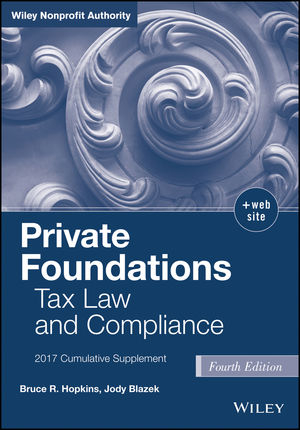
Private Foundations
John Wiley & Sons Inc (Verlag)
978-1-119-39250-7 (ISBN)
- Titel ist leider vergriffen;
keine Neuauflage - Artikel merken
The must-have tax law reference for private foundations, updated for 2017 Private Foundations provides an authoritative reference and extensive analysis of tax law and compliance in the private foundations arena, with a wealth of practical tools to streamline applications, filing, and reporting. This 2017 Cumulative Supplement captures the latest regulatory developments for easy reference, with coverage of tax-exempt status, the self-dealing rules, mandatory distribution, jeaopardizing investments, taxable expnditures, annual reporting to the IRS, winding up a foundation's affairs, and much more. Comprehensive line-by-line instructions are included for a variety of exemption applications and tax forms, and easy-to-use checklists highlight areas of critical concern to help you avoid oversights. Sample documents are provided to guide the composition of organizational bylaws and various letters, and completed IRS forms provide practical reference for side-by-side comparison. With comprehensive, up-to-date coverage of the private foundations space alongside helpful tools and visual reference, this book is a resource every foundation's needs.
Written by two of the nation's leading authorities on private foundations, this supplement provides essential guidance you can trust. Clear, concise instructions focused on real-world use makes this reference a critical companion for those tasked with the responsibility of maintaining a foundation's tax-exempt status and staying out of regulatory difficulties. * Learn the latest guidelines for compliance, reporting, and eligibility * Access the latest regulatory changes quickly and easily * Organize reporting and applications with checklists and sample forms * Find valuable tools and reference for all aspects of private foundation compliance Increasing IRS scrutiny makes compliance a more critical issue than ever before. An organization's tax-exempt status is generally vital to its continued operation, and a single oversight can put the future in jeopardy and staying out of regulatory difficulties. Private Foundations provides detailed instructions, examples, and much-needed answers on all aspects of private foundation tax law and compliance.
BRUCE R. HOPKINS (Kansas City MO) is a senior partner with the firm Polsinelli Shughart PC. He is also the author of more than 35 books, including The Law of Tax-Exempt Organizations, 10e, The Law of Fundraising, 4e, Nonprofit Law for Colleges and Universities, Nonprofit Governance, and Nonprofit Law Made Easy, as well as the monthly newsletter Bruce R. Hopkins' Nonprofit Counsel, all published by Wiley. JODY BLAZEK, CPA, (Houston TX) is a partner in Blazek & Vetterling, LLP, an accounting firm that focuses on financial planning, tax compliance, and auditing for tax-exempt organizations and the individuals who create, fund, and work for them.
Preface ix
Book Citations xi
Chapter 1: Introduction to Private Foundations 1
1.6 Foundations in Overall Exempt Organizations Context 1
1.10 Private Foundations Sanctions 1
Chapter 2: Starting and Funding a Private Foundation 3
2.5 Acquiring Recognition of Tax-Exempt Status 3
2.7 When to Report Back to the IRS 18
Chapter 3: Types of Private Foundations 19
3.1 Private Operating Foundations 19
3.1A Exempt Operating Foundations 19
Chapter 4: Disqualified Persons 21
4.4 Family Members 21
Chapter 5: Self-Dealing 23
5.1 Private Inurement Doctrine 23
5.3 Definition of Self-Dealing 24
5.4 Sale, Exchange, Lease, or Furnishing of Property 24
5.6 Payment of Compensation 26
5.8 Uses of Income or Assets by Disqualified Persons 26
5.10 Payments to Government Officials 27
5.11 Indirect Self-Dealing 28
5.12 Property Held by Fiduciary 29
5.15 Issues Once Self-Dealing Occurs 29
Chapter 6: Mandatory Distributions 31
6.2 Assets Used to Calculate Minimum Investment Return 31
6.5 Qualifying Distributions 31
6.7 Satisfying the Distribution Test 33
Chapter 7: Excess Business Holdings 35
7.1 General Rules 35
7.2 Permitted and Excess Holdings 36
7.3 Functionally Related Businesses 36
7.4 Rules Applicable to Certain Supporting Organizations 37
7.6 Excise Taxes on Excess Holdings 37
Chapter 8: Jeopardizing Investments 39
8.1 General Rules 39
8.2 Prudent Investments 39
8.3 Program-Related Investments 40
Chapter 9: Taxable Expenditures 43
9.1 Legislative Activities 43
9.2 Political Campaign Activities 44
9.3 Grants to Individuals 44
9.4 Grants to Public Charities 44
9.4A Grants to Exempt Operating Foundations 45
9.5 Grants to Foreign Organizations 46
9.6 Expenditure Responsibility 47
9.9 Distributions to Certain Supporting Organizations 47
9.10 Excise Tax for Taxable Expenditures 47
Chapter 10: Tax on Investment Income 49
10.3 Formula for Taxable Income 49
Chapter 11: Unrelated Business Income 51
11.1 General Rules 51
11.2 Exceptions 51
11.3 Rules Specifically Applicable to Private Foundations 51
11.5 Calculating and Reporting the Tax 52
Chapter 12: Tax Compliance and Administrative Issues 53
12.1 Successful Preparation of Form 990-PF 53
12.2 Reports Unique to Private Foundations 57
12.3 Compliance Issues 57
Chapter 13: Termination of Foundation Status 63
13.4 Operation as a Public Charity 63
13.5 Mergers, Split-Ups, and Transfers between Foundations 63
Chapter 15: Private Foundations and Public Charities 67
15.4 Publicly Supported Organizations Donative Entities 67
15.5 Service Provider Organizations 67
15.7 Supporting Organizations 68
15.8 Change Of Public Charity Category 79
Chapter 17: Corporate Foundations 81
17.3 Private Inurement Doctrine 81
17.5 Self-Dealing Rules 81
Chapter 18: Nonprofit Governance and Private Foundations (New) 83
18.1 State Law Overview 84
18.2 Board of Directors Basics 88
18.3 Principles of Fiduciary Responsibility 91
18.4 Duties of Directors 92
18.5 Board Composition and Federal Tax Law 93
18.6 Sources of Nonprofit Governance Principles 95
18.7 Relevant Nonprofit Governance Issues 122
18.8 Nonprofit Governance Policies 145
18.9 Role of IRS in Nonprofit Governance 146
18.10 Governance Principles and Private Foundations 156
Cumulative Table of Cases 163
Cumulative Table of IRS Revenue Rulings and Revenue Procedures 167
Cumulative Table of IRS Private Determinations Cited in Text 171
Cumulative Table of IRS Private Determinations Discussed in Bruce R. Hopkins’ Nonprofit Counsel 179
Cumulative Table of IRS Private Letter Rulings, Technical Advice
Memoranda, and General Counsel Memoranda 183
Table of Private Foundation Law Tax Reform Proposals 201
About the Authors 211
About the Online Resources 213
Cumulative Index 215
| Erscheinungsdatum | 30.01.2018 |
|---|---|
| Verlagsort | New York |
| Sprache | englisch |
| Maße | 179 x 251 mm |
| Gewicht | 400 g |
| Themenwelt | Recht / Steuern ► EU / Internationales Recht |
| Recht / Steuern ► Steuern / Steuerrecht | |
| Wirtschaft ► Betriebswirtschaft / Management | |
| ISBN-10 | 1-119-39250-0 / 1119392500 |
| ISBN-13 | 978-1-119-39250-7 / 9781119392507 |
| Zustand | Neuware |
| Informationen gemäß Produktsicherheitsverordnung (GPSR) | |
| Haben Sie eine Frage zum Produkt? |
aus dem Bereich


